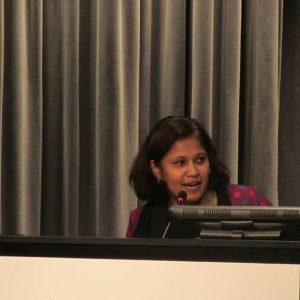
Below are brief remarks I gave at a conference hosted by CUNY Law Review on Transformative Immigrant Defense in March 2017. I post here with some minor edits to offer some reflections on immigrant organizing and the need to support leadership from those most impacted.
I am thrilled to be here today with an intention of gathering our wisdom around law and organizing with a particular emphasis on immigrant defense.
Law@theMargins while a recent legal formation, the focus on law and organizing has been the central tenet of my work for the last 20 years.
The questions Law@theMargins asks: what would our legal practice look like when we center community initiatives to self organize, self determine their own agendas, some into formal organizations, others collectives, provide strategic legal support to actualize community’s vision for liberation instead of us determining those policies.
What would our legal practice look like if we center those most marginalized in our society and redistribute our resources to those communities.
This law and organizing approach is not new, but we have seen movement lawyers emerge in the civil rights, black power movement of the 70s, and anti-colonial struggles. Some of you may know an iconic picture of Angela Davis whispering in the ear of her lawyer Leo Branton who represented prominent black performers, including Nat King Cole and Dorothy Dandridge, argued cases on behalf of the Black Panthers and the Communist Party, and filed numerous cases alleging police abuse. But the case with which he was most closely associated was that of Ms. Davis.

Over time, with the attack on legal services, professionalization and specialization of the field, we retreated into our issue silos, and the potent radicalism of law and organizing became diffuse.
But for me, this mode of lawyering felt the most organic to my own experience as a migrant, Muslim woman of color, raised in the working class neighborhood of the Bronx. It felt less alien than the image of the detached, objective lawyer, often white male, who was deraced, cis-gendered, and not connected to those he served. That was not my lived experienced.
In 2003, when Bangladeshi immigrants were among the 26 countries to register at Federal Plaza, it was the call from aunts that saw me as a kid that “your uncle was detained” can you do something that reminded me I am not a lawyer outside of the community I serve, but a part of it. Or, more recently, it was the call that a loved one is incarcerated at Rikers, can you come with me to visit that moved me to action.
I was nurtured by the communities I am called to represent, and this connection, informs my lawyering as collective, community oriented, and empathetic, and lawyering as community defense..
Post 1996, post 9-11, and the years since we have revisited our modes of lawyering, and returned to movement lawyering because this is desperately needed.
We lost ground as criminal law, immigration, mass incarceration ballooned, and we were not often able to see the interlocking system of oppression. In seeking some relief in our corner of advocacy, we often unwittingly reinforced another equity. This called for us to employ an intersectional analysis.
While legal systems saw our laws as distinct, communities experienced them as one.
But communities under attack defended and have survived, and we need to revisit these modes of community defense now, and lift those strategies up.
In a piece I wrote after the 2016 presidential election, I called on all lawyers wherever they were at to orient their legal support to communities under attack and for us to work in a coordinated fashion. I hope we do.
We do not need identical strategies but we do need shared vision to resist the current administration, white supremacy, travel ban, policies to both stop any regressive laws, and to undo the damages of the years prior.
Here, I want to pause for immigrant advocates to integrate an analysis of white supremacy into their work because we who study immigration history know the structures of racialization undergird in pernicious ways our immigration system. We know that detention as a policy was implemented to block Haitians from entering, while for politically motivated reasons welcomed Cubans. Race is a factor.
Make no mistake the Muslim ban, registry was not the first time that we are awakened to Islamophobia, but that any practice of the Islam was prohibited by slave owners, and surveillance of mosques did not just emerge post 9-11, but Black Muslims/Nation of Islam members were subjected to surveillance.
I mention this because if we are able to see these connections, we are able to speak to our movement elders about how to resist in this particular political moment.
Some of our lessons have been laid out for us.
As lawyers, your resistance may come from directly representing someone in court, it may come as I do to provide legal support on sanctuary campaigns and community defense. We each have a role to play.
The idea is not to be everywhere or do everything but know that each of us got us, and that what we need is to bring this intersectional advocacy, analysis of white supremacy, classism and other oppressions into where we are at.
Let me give you a example of where this made a difference by a grassroots organization – DRUM. With the threats of Muslim registry, there well intentioned calls for non-Muslim, whites to register to show solidarity. But DRUM as well as movement lawyers having direct knowledge of the 2003 Special Registration called for an outright opposition and urged Obama to dismantle the registry system which could be revived. This campaign was victorious, and this required Trump to use executive orders for his travel ban. I am not saying this is where we want to land, but we could have been in a much worse situation if we did not plan our strategies knowing our movement history, and this background.
Last point, I would like to add that while there is great emphasis to be interdisciplinary, I would like us to also be global in our immigration work, to add a decolonial frame. Sangeeta Richards was a domestic worker whose legal case was brought by trafficking advocates without connecting to CBOs more knowledgeable of South Asian geopolitics. If they had, the case would have had a better outcome and instead the advocates experienced a push-back from the more elite members of the diaspora silencing the long term worker organizers in the community. Hunger strikers fleeing political persecution finding themselves called terrorists requires lawyers to understand the politics of War on Terror. This I hope will push us for more global network.
Today, we have an excellent line-up, many familiar faces, and eager to meet new ones, and I am thrilled to learn from you.




